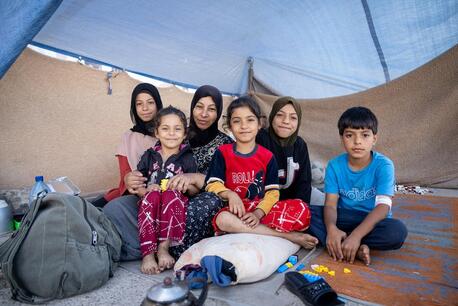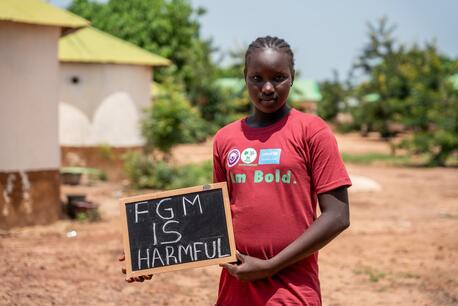
Keeping Girls in The Gambia Safe From FGM
An upcoming vote will put The Gambia's ban on female genital mutilation to the test. Facing opposition from religious leaders, Nafisa Binte Shafique, UNICEF Representative in The Gambia, has built a broad coalition to ensure that girls' rights and health are respected and protected.
The fight against FGM aims to protect girls' bodies and their futures
Over 230 million girls and women worldwide have undergone some form of female genital mutilation (FGM), an excruciating and unnecessary practice most often carried out on girls between infancy and age 15. In many countries, communities are moving towards abandoning FGM, which harms girls and women physically and psychologically, but progress is slow and hard-won.
In 2015, The Gambia took a bold step by criminalizing FGM, setting a global precedent for progressive legislation. Conservative religious leaders are now challenging this law, despite the fact that there is no authentic reference to FGM in Islam and it is not practiced by the majority of Muslims worldwide, including the population of Saudi Arabia. This pushback is fueled by deep-seated social norms, perpetuated by fear of judgment and ostracism.
Tensions escalated in August 2023, when three women became the first Gambians to be fined for performing FGM. Imam Faty, an Islamic cleric, controversially raised funds to pay the fines, igniting further discussion. In March 2024, a National Assembly Member introduced a bill to overturn the ban, endangering girls once more. Public opinion varies, with some supporting repeal for cultural or religious reasons, while others oppose it due to health risks and human rights concerns. Political debates within the Assembly reflect diverse opinions influenced by constituencies, personal beliefs and understanding of the issue.
A debate on the report to be submitted by a National Assembly Committee and a vote by National Assembly Members — almost all of whom are men — are expected to take place in June. If the bill passes, The Gambia will become the first country ever to repeal a ban on FGM.
UNICEF USA recently met with Nafisa Binte Shafique, UNICEF Representative in The Gambia, to learn more about UNICEF's efforts to protect girls and highlight the dangers of FGM. It's crucial that FGM remain illegal, as it poses severe physical, mental and social risks to girls and women.
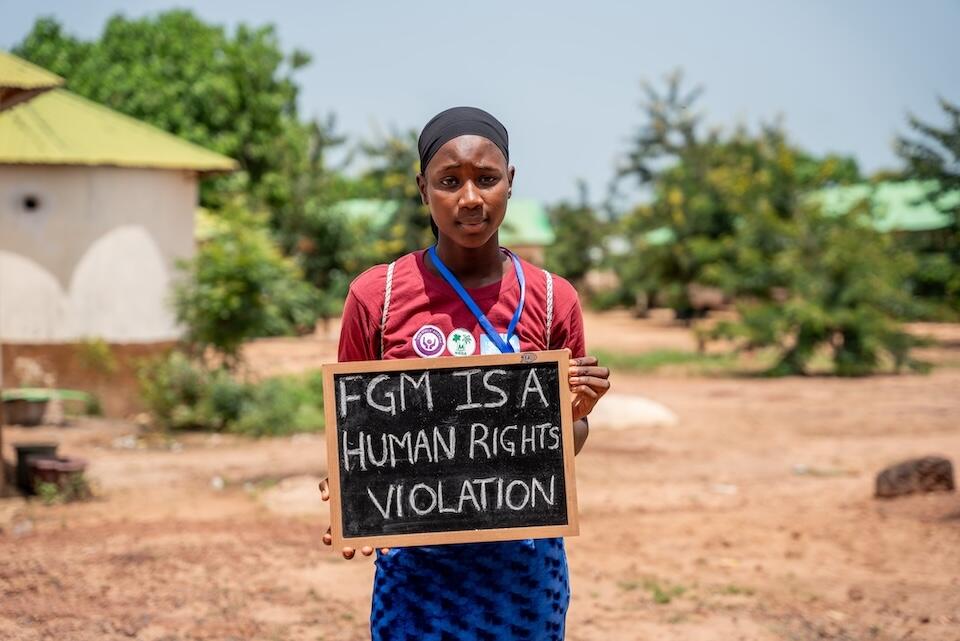
Q: Despite the criminalization of FGM, 73 percent of Gambian girls and women between the ages of 15 and 49 have been subjected to this cruel practice. It's a severe violation of their human rights. How is UNICEF working to educate Gambians about the dangers of FGM?
NAFISA BINTE SHAFIQUE: First of all, thanks for your interest in The Gambia, particularly regarding the recent debate about the FGM situation in the country. FGM has been practiced in The Gambia and many other countries in the world, and it is significantly harmful. It derives from socio-cultural norms and prejudices. From our experience, we know addressing any social norm takes time. Evidence suggests the FGM rate has decreased slightly over the past few years and some progress is being seen in the younger population, from 56 percent in 2010 to 50 percent in 2018 among girls from 0 to 14 years old, and from 38 percent in 2010 to 27 percent in 2018 among girls 0 to 4.
This progress is not satisfactory, and there is still a lot of work to be done, and acceleration to be achieved. We have recognized that while the concept of human and child rights is crucial, it isn’t always readily accepted or even comprehended by communities and traditional leaders. So we are approaching this issue from additional perspectives, such as health. This is a compelling argument, supported by scientific evidence showing that FGM is a harmful traditional practice with negative health implications. From a health perspective, there are absolutely no benefits of FGM. The UN has gathered ample evidence through significant research, and there is not a single scientific study demonstrating any health benefit for girls and women.
From a health perspective, there are absolutely no benefits of FGM. The UN has gathered ample evidence through significant research, and there is not a single scientific study demonstrating any health benefit for girls and women.
Studies have shown that FGM leads to fistula, infertility, difficult delivery, and maternal and child deaths. We hear discussions from different stakeholders who have proposed a middle ground of medicalizing the FGM procedure or making it a matter of choice after the age of 18. In my opinion, the fragile and overloaded health care system in The Gambia struggles to provide basic health care to all citizens with adequate quality. Given that FGM has no benefit, it does not warrant medicalization. Furthermore, despite The Gambia ratifying the UNCRC, CEDAW and the Maputo Protocol, and the country's constitution mentioning the protection of the rights of girls and women, concerns about protecting their health and well-being persist as a challenge.
There is also no authentic religious literature that suggests FGM as a mandatory or even optional practice. While male circumcision is mandated, FGM has no basis in any religion, including Islam. This practice originated in pre-Islamic times, possibly from Pharaonic culture. However, at a later stage, when Islam was introduced, the cultural practice was mistakenly labelled as a religious practice. Despite lacking authentic religious justification, it persisted and became ingrained as a social norm, widely practiced by communities. Therefore, there is no evidence to suggest that FGM is mandated by religion, and in fact, it brings about a range of health and social harms as I just mentioned. It must be stopped immediately.
Going back to your question about what we are doing on the ground, along with UNFPA and with the support from the development partners, we have been advocating at different levels against the potential repeal of the law banning FGM including the lawmakers; sensitizing and raising awareness on FGM violations with a focus on young people, in particular girls as agents of change; supporting CSOs [civil society organizations] to mobilize communities against FGM; implementing social and behavioral change interventions and releasing a public statement on FGM repeal together with the UN family, among other actions.
However, much needs to be done for the mid- and long term to create an enabling environment at the national, regional and community levels, along with empowering girls and boys — particularly the 10 to 14 age group — to take charge and make informed decisions. All of these would need significant resources.

Q: Is UNICEF partnering with other organizations to fight the potential repeal of the FGM ban?
NAFISA BINTE SHAFIQUE: UNICEF and UNFPA globally implement a Joint Programme on the Elimination of Female Genital Mutilation supported by a number of development partners, including the USA. In The Gambia, our nodal partner for the Joint Programme is the Ministry of Gender, Children and Social Welfare, along with other ministries such as the Ministry of Health, Ministry of Education and Ministry of Justice. We implement our programs through both the Government and CSOs, to reach communities at the grassroots level. We are also partnering with Gambian FGM survivors and activists. One such organization we are partnering with is WILL (Women in Liberation and Leadership), led by Fatou Baldeh, who recently received the Women of Courage Award from the US Administration.
Through the UN Joint Programme, we are supporting a CSO umbrella organization called TANGO and the Network on Gender-Based Violence (NGBV) to bring all relevant CSOs together and to have a unified approach to advocacy, community engagement and adolescent empowerment to create a social movement against FGM.
The Ministry of Gender, Children and Social Welfare supports these joint efforts. The minister recently visited the U.S. and took the opportunity to meet with several high-level stakeholders, including UNICEF Executive Director Catherine Russell.
Q: The Gambia was a dictatorship at the time FGM was criminalized. The country has been a democracy since 2017 — what is the current government's position on FGM?
NAFISA BINTE SHAFIQUE: The minister sent a follow-up note to the meeting with ED Russell, where she explained that the Government does not support the repeal of the ban on FGM. However, the National Assembly has decided to take it through a democratic process.
I must also express my deep concern about this rollback on child and human rights. If the National Assembly decides to repeal the law, the nation will see more setbacks in future. Possibly the next bill would be to legalize child marriage and other forms of gender-based violence. This dangerous precedent not only affects the country, but also the region and the entire world.
Besides the note from the minister, there has not been any communication from the Government stating their position on this issue. As we speak, the Parliamentarian Gender and Health Committee is consulting various stakeholders and experts to prepare a report to be shared with the National Assembly during the June session. It’s important to note that the National Assembly in The Gambia is predominantly composed of men, with only 9 to 10 percent representation by women. Therefore, these discussions predominantly involve men, which is far from ideal. Women should have a more prominent voice and adequate space to raise their concerns, share their stories of suffering and assert their rights. Furthermore, it’s crucial to highlight that the issue of repealing the law has become highly politicized, leaving very little room for women to express their opinions.
I must also express my deep concern about this rollback on child and human rights. If the National Assembly decides to repeal the law, the nation will see more setbacks in future. Possibly the next bill would be to legalize child marriage and other forms of gender-based violence. This dangerous precedent not only affects the country, but also the region and the entire world.
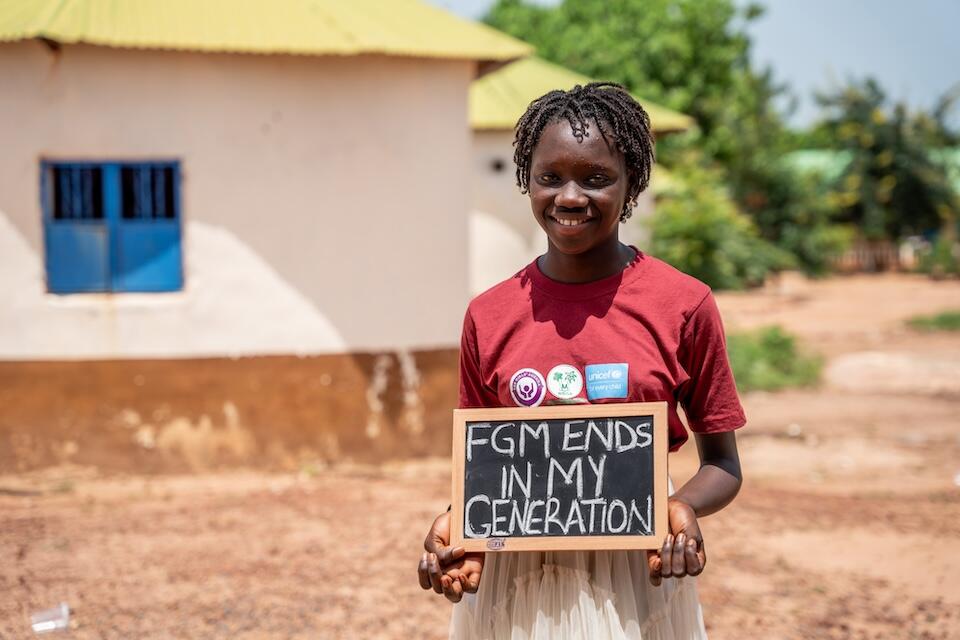
Q: What happened after FGM was criminalized in 2015?
NAFISA BINTE SHAFIQUE: The law has not been adequately enforced since 2015, but at least there has been a policy and legal framework in place to protect girls and women. To my knowledge, the second prosecution took place in September 2023 when three elderly circumcisers were reported to the police by the communities for performing and abetting FGM on eight girls aged between 4 months and 1 year. They were fined 15,000 Dalasis [approximately $220] or sentenced to one year in prison, a punishment inconsistent with the prescribed three years' imprisonment. This case was reported due to the UN Joint Programme’s intervention at the community level, empowering communities to protect their girls. Unfortunately, an Islamic cleric raised funds and paid bail for the convicted women, resulting in their release. This incident sparked the movement to repeal the act and lift the ban on FGM.
Although it originated with the religious groups, both religious groups and society at large in The Gambia are deeply divided. While many support the repeal, there are also brave advocates speaking up to maintain the ban. Critics have attacked the United Nations several times. We have released two statements since the bill was introduced, one jointly from the entire UN and one from me and the UNFPA Representative. So we are very vocal about it.
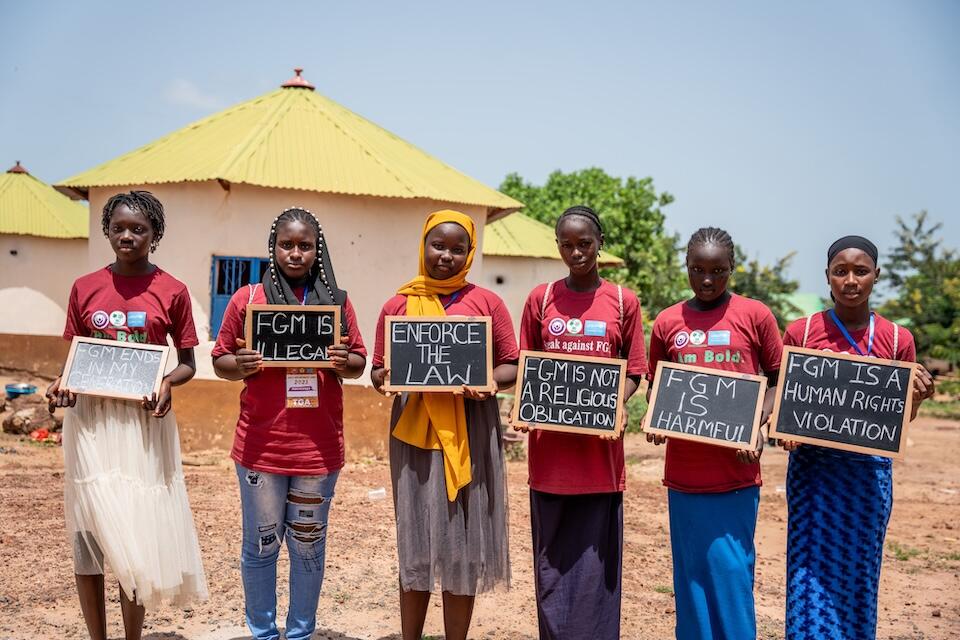
Q: How is UNICEF working to encourage girls to speak out against FGM?
NAFISA BINTE SHAFIQUE: UNICEF is equipping girls with knowledge and skills so they can be social change agents in their families, communities, schools, everywhere.
We have established FGM clubs, and members have been very instrumental to come out on the street and really claim their rights and protest about what is happening. Both girls and women came out on the street on the day that the bill was read for the second time. And before that, they also had a silent march to the National Assembly that went viral all over the international media and also, of course, national media.
So these events were happening because we supported the women's organizations and girls' organizations and we provided not only financial and technical support, but we have kept in direct communication with them because it's a small country and you can reach out to anyone anytime.
Q: Could you elaborate on the impact of social pressures within patriarchal societies on perpetuating harmful practices like FGM?
NAFISA BINTE SHAFIQUE: Many girls are unaware that they were mutilated when they were very young, sometimes as early as 48 hours old. I heard that there's a new trend where mothers, under social pressure, are using their nails to remove their baby's clitoris! While we have enough evidence to present on this, it’s crucial to note the immense social pressure families face, potentially making adherence to such practices a survival mechanism. However, the question arises: At what cost? Before marriage ceremonies, girls are often taken to hospitals to unstitch them. This practice is aimed at proving their virginity, a highly valued trait in patriarchal societies.
Sexual violence, domestic abuse, sexual harassment, forced marriages, psychological violence and FGM are forms of gender-based violence practiced in The Gambia and are mostly caused by family or individuals that are close. These harmful practices are deeply rooted in patriarchal norms, which need to be handled.
In the context of The Gambia, there is still a prevalence of gender-based violence as a result of the patriarchal norms that continue to violate the human rights of girls and women. Sexual violence, domestic abuse, sexual harassment, forced marriages, psychological violence and FGM are forms of gender-based violence practiced in The Gambia and are mostly caused by family or individuals that are close. These harmful practices are deeply rooted in patriarchal norms, which need to be handled. FGM is still highly linked to marriageability. In many communities, a man would not marry a girl if she has not been mutilated. So families actually feel they are doing something good, actually doing a favor to the girl child that will ensure she can get a husband and build a family.
We are working tirelessly, along with partners, to raise awareness among different stakeholders and the community at large, empower adolescent girls and boys, create an enabling and protective environment for them and, most importantly, ensure a strong system in place to fight patriarchy by ensuring that health, justice and welfare systems are adequately equipped.
Q: Are boys and young men joining girls and women to support the FGM ban?
NAFISA BINTE SHAFIQUE: Increasingly, young men are empathizing with their wives and expressing concerns for their daughters’ well-being. They're saying, “I don't want my daughter to go through this.” They witness the maternal and child health complications resulting from FGM, which also affect men and boys in various ways. Under the UN Joint Programme, we have initiated interventions on positive masculinity to challenge traditional notions of masculinity and engage men and boys more actively. While the capacity for effectively working with men and boys is limited, we are making progress.
HOW TO HELP
There are many ways to make a difference
War, famine, poverty, natural disasters — threats to the world's children keep coming. But UNICEF won't stop working to keep children healthy and safe.
UNICEF works in over 190 countries and territories — more places than any other children's organization. UNICEF has the world's largest humanitarian warehouse and, when disaster strikes, can get supplies almost anywhere within 72 hours. Constantly innovating, always advocating for a better world for children, UNICEF works to ensure that every child can grow up healthy, educated, protected and respected.
Would you like to help give all children the opportunity to reach their full potential? There are many ways to get involved.




